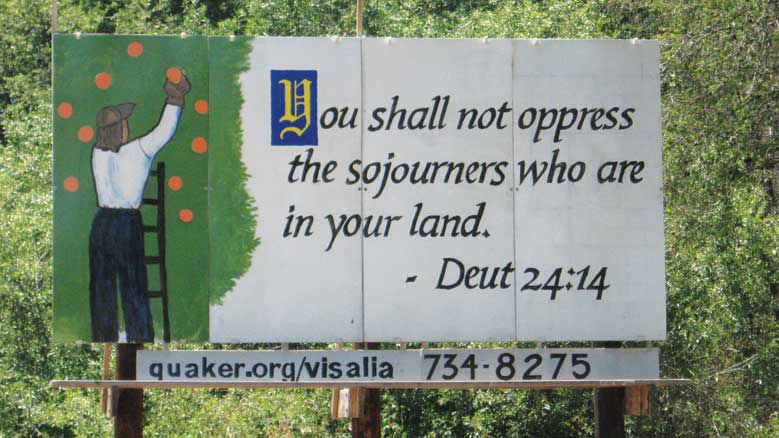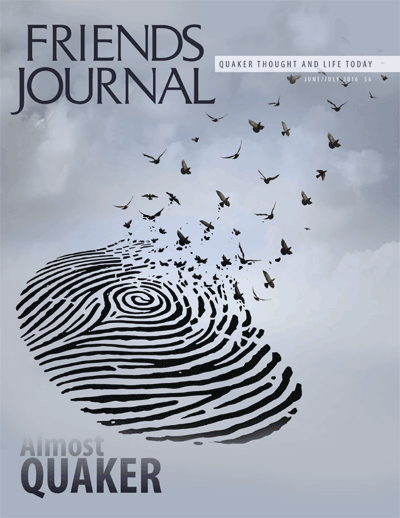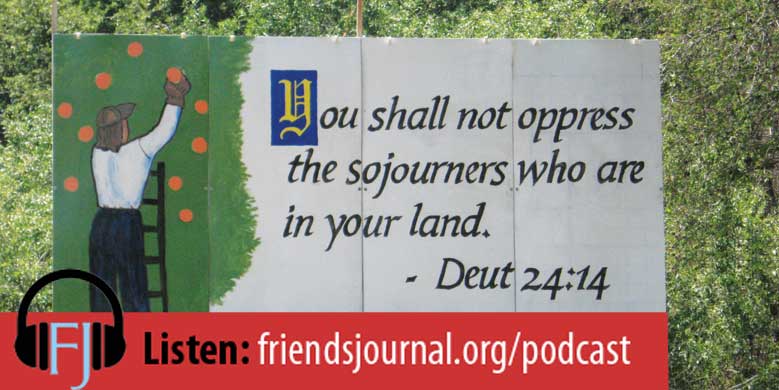
FJ PODCAST SUBSCRIPTION: ITUNES | DOWNLOAD | RSS | STITCHER
About eight years ago, I was driving on the main road near my new home in California’s Central Valley. I live near Sequoia National Park. The valley below the park has some of the largest citrus groves and vineyards in the state. This is one of the places John Steinbeck visited early in his career. Here, Sanora Babb, a refugee camp nurse, compiled stories of Dust Bowl refugees and their children struggling with the desperate poverty and health issues of the depression. Steinbeck, after reading the stories of the farm workers’ and refugees’ hardships, went on to write The Grapes of Wrath. Here, too, farm worker struggles in the ’60s during the time of Cesar Chavez rocked the region. Farmers were forced to negotiate with labor when they formed a union. Their struggle here continues.
As I was passing a billboard near a Quaker meeting, I saw a hand-painted scene of a farm worker picking oranges next to a Bible passage: “You shall not oppress the sojourners who are in your land. —Deut. 24:14” I cannot emphasize enough how daring that is here in a conservative, rural county. I was intrigued and decided at once to attend the meeting.
I was not disappointed. Here, with my wife and infant daughter, I found people who happily welcomed me into their meeting. I felt at once at home. Now, eight years later, I have joined and am watching my daughter grow into a caring, considerate young lady. I realized much of what the Quakers have been a part of, I had always supported. I was always amazed at those who helped the Underground Railroad. I had always liked the speeches of Martin Luther King Jr. I had always appreciated those who organized to end the Vietnam War. I hadn’t known it at the time, but from an early age, I was on a track to become a Quaker.
I find it remarkable that though I became more involved in my meeting, no one encouraged me to do anything. In fact, none of the Friends encouraged me to be more involved; the Friends simply listened. I joined the meeting when it was clear to me that it was the right time to do so. Because the decision was mine, it was obvious that it was right for me. I can’t imagine having been lobbied to join, and had I been, I wonder if I’d have had the same appreciation for my meeting. Because I was allowed to develop my own level of involvement, I chose a gradual path. I found the benefits of the meeting stood the test of time. Now, when I don’t attend Sunday worship, I miss the familiar, relaxing state I have come to crave. I cannot imagine working Sundays and feeling the stress of landscaping and running about trying to make ends meet. By taking a day to focus on myself, I am better able to ride out office politics at my work, taxes, or whatever comes my way. In fact, I have found my blood pressure is not as high as it was a decade ago.
Standing on the corner of a main street, I learned to control my temper when holding up “No War” signs at the monthly antiwar rally. When young war supporters swore at some of the grandmothers, I was delighted at how they would never frown but continue to wave and smile. It was disarming, literally. I was learning to love my chosen family.
I remember visiting England, determined to visit an old meetinghouse. I chose the Yealand Quakers. I was thrilled to see names carved in the same wooden door George Fox had passed through. The benches were smoothed from centuries of Friends meditating. I sat quietly. I noticed there were almost no young people. After we stood and shook hands, I was asked if my meeting suffered from few children also. I was proud to reply that we have many young people, and in fact, the addition of agricultural activities and gardening had increased the size of our meeting. We continue to get folks who are looking for something real, not just a book of rules for life.
As for the “almost Quakers” who come but don’t join, I am very careful to be their friend but never push them to make a decision. I listen to why they came. I listen to their struggles, and I smile. If they join, it will be their decision. If they haven’t joined, it’s because it hasn’t yet become obvious to them that showing up each Sunday might have nothing to do with our food (for which we are well known) but is rather about nourishment of another kind. Each year, another one or two join. All is as it should be. The incredibly democratic nature of this process encourages a spiritual responsibility that makes our meeting stronger.
I like it when people tell me that they will never join, yet they continue to attend. It is as if they have to prove something to themselves. They have to believe that they could leave at any time. In fact they could, yet they come still. Again, all is as it should be. Baby steps in spiritual development is key to finding a measured, profound understanding of one’s self.
Since I first came, the billboard has changed many times. The messages have been short, sweet, and to the point. One time I painted one with my then six-year-old daughter. I cannot tell you how many times people have come to me and confessed they like the billboards and would like to attend, but they already go to one church or another. I am always quick to say, “All are welcome, anytime.” Often they do visit and end up coming again. I never want to lobby anyone. If they are meant to be here, they will stay.
Our Easter breakfast has become an event where even the most distant friends of Friends come and enjoy the dogwood and flowering bulbs in the meetinghouse gardens. We find this event draws more people each year. Nearly every progressive in town comes to sit under the giant Quaker oak in silence, hearing only the laughter of children in the field nearby.







I can’t claim credit for more than transcribing this article. It was really written by hungry dust bowl immigrants, exploited farmworkers and people through the last century who suffered and those who suffered alongside them. I am grateful for their efforts and those who continue the struggle today.
Andrew I almost teared up reading this. The simple truth is so simple!
Hi Andrew,
Thanks for sharing this story and your journey to Quakers.
Our local Meeting House has a triptych at the entrance with the words “Peace is the Way”.
A few years ago Friends from our local meeting spent a week in Lancashire, England, visiting the old Meeting Houses of the Early Quakers, and we stayed in the old school room at Yealand Conyers. I felt the same sense of timelessness as you capture in your description of the wooden benches and the doors smoothed over centuries’ use.
It is a sad fact that some of these old Meeting Houses now lack many young people. They have suffered as our young people from these villages have left home and moved to the larger towns and cities to work and raise families.
Like yourself, I appreciate the Quakerly way of becoming a member. I have attended my local meeting for a number of years and only recently become convinced. Strangely the catalyst was a visit to Southern Africa Friends where I became aware of our larger Quaker Family.
Andrew,thank you for joining bill and his friends. Your signs are an inspiration every time I drive by. The quakers are awsome.